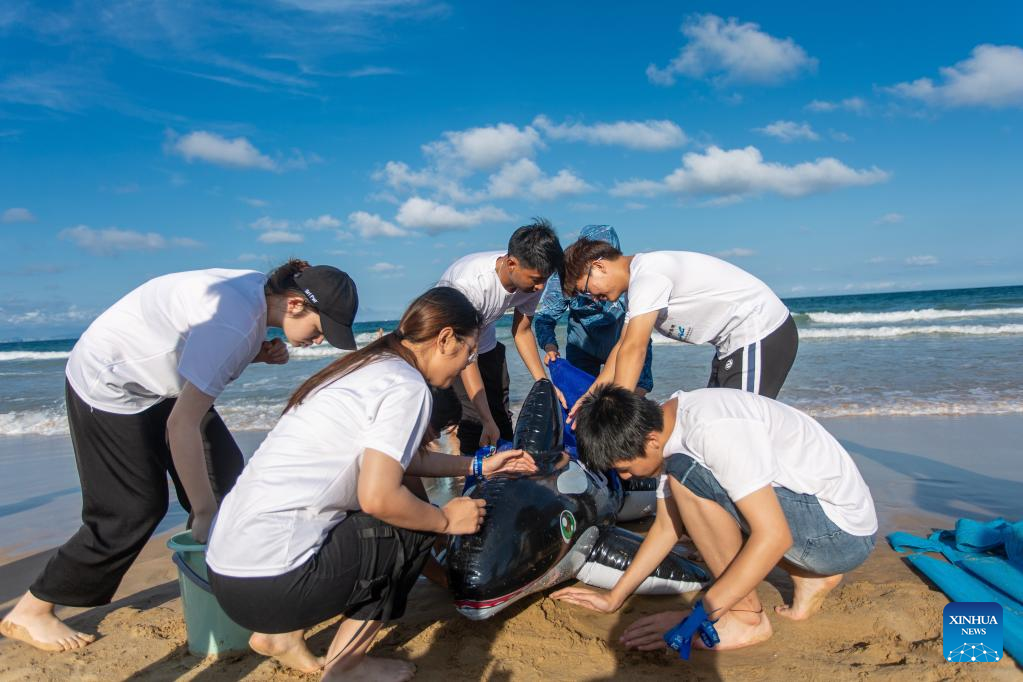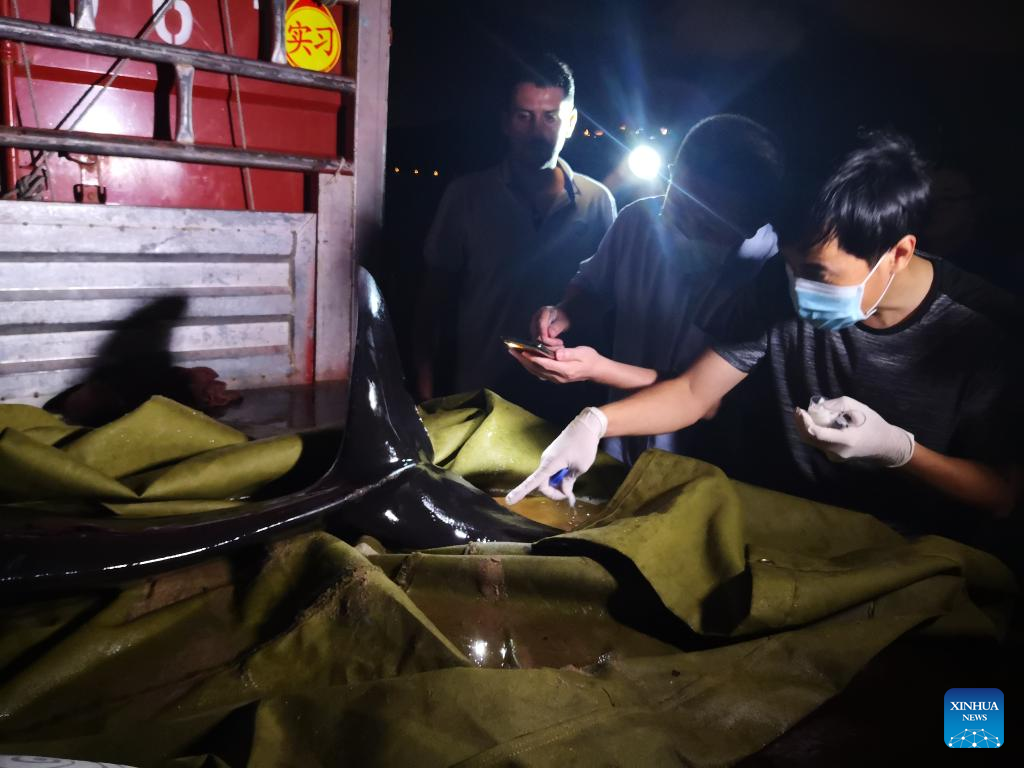
A drill on rescuing stranded animals, organized by the BlueRibbon Ocean Conservation Association (BROCA), is conducted in Sanya, south China's Hainan Province, on May 22, 2021. (Xinhua)
HAIKOU, March 3 (Xinhua) -- When Pu Bingmei failed to save the life of a stranded pilot whale named Yaya in 2019, she cried like a child.
"The medical team and their equipment were prepared already that night and they were planning to fly to Hainan the next morning. But Yaya didn't make it," said Pu in tears, as she recalled the woeful loss of the whale.
"I'll try my best and make more contributions to the protection of wild marine animals like you," Pu said when she bid farewell to Yaya.
Pu, 36, is the secretary general of the BlueRibbon Ocean Conservation Association (BROCA), a non-profit organization based in Sanya City, south China's Hainan Province. For more than a decade, she has been dedicated to the protection of marine species such as stranded dolphins and whales.
Over the years, she has not only been helping with the protection of marine species, but also raising public awareness of environmental protection.
Pu came to the coastal resort city of Sanya in 2007, when she entered college. Hailing from northwest China, she had never seen the ocean in person before.
"I was so excited when I saw the clear seawater," she said. "I could see little fish swimming around, and I just wanted to dive in."
As years went by, however, she gradually found that the condition of the seawater began to worsen and that it "smelt bad."
"I accidentally got to know about BROCA and started doing volunteer work such as picking up garbage at the sea," she said. After graduation, she became a full-time volunteer for BROCA, engaging in all kinds of environmental work.
On June 6, 2019, when she was celebrating her daughter's birthday, Pu received an emergency call about a pilot whale that was found stranded in Sanya. She immediately set off to go to the scene.
The whale was later transferred to the Institute of Deep-sea Science and Engineering, under the Chinese Academy of Sciences, for better treatment.
"She couldn't swim by herself and wasn't able to sense the presence of obstacles when she was found," said Pu. To prevent the whale from knocking into hard objects and getting hurt again, it had to be monitored around the clock. BROCA started recruiting volunteers online to join the rescue operation.
Soon, a WeChat group of volunteers was set up. Scientists, veterinarians, and volunteers worked in shifts to provide medical treatment and supervise the physical and mental condition of the whale.
"I couldn't sleep at all after Yaya was rescued. We also contacted medical groups with knowledge of marine animals from other places, and spared no efforts to find available medical equipment for her."
But the joint efforts failed to save the whale's life.
A sense of self-blame and helplessness overwhelmed Pu when she heard the news of the whale's death.
But she knew that losing Yaya was not the end, but the start of more dedication to the protection of marine animals.
Yaya's passing inspired Pu to form a cooperation network for rescuing stranded wild marine animals.
For years, together with others at BROCA, Pu has been dedicated to raising public awareness of ocean protection and offering education programs to volunteers on how to save and assist wild marine animals.
In 2021, BROCA invited professors and scientists from marine biological research institutes in China to give lectures detailing the correct procedures for saving stranded marine animals to fisherfolk living in coastal villages, civilian rescue teams, divers and sailors, as well as volunteers from universities.
But Pu was fully aware that lectures alone were not enough.
"We also carried out some drills on rescuing stranded animals during the training," Pu told Xinhua.
Pu's persistence and hard work is now finally paying off.
Last April, a tourist spotted an injured Indo-Pacific bottlenose dolphin stranded in a bay in Hainan. This time the first witness took the right action -- calling BROCA as soon as she found the dolphin and keeping an eye on it until the rescue team arrived.
Volunteers named the dolphin "Chess" because it was discovered in the Bay of Chess, in Hainan.
After almost a year of intensive care in a marine biological base in Hainan's Danzhou City, "Chess" recovered and was released into the sea on Wednesday.
"This is our first successful case of saving a stranded dolphin and helping it get back to the sea," said Pu. "I'm thrilled to see 'Chess' back in its home. It gives my colleagues and me more confidence in our efforts to protect such wild animals."
These days, what makes Pu especially pleased is people's rising awareness of the need to protect wild animals in China.
In the past, she used to hand out gifts on the streets to attract people's attention to ocean protection needs and efforts. At that time, people were far more interested in the gifts than in what she was trying to promote.
"But now, more and more netizens find us online and call us to get details about our activities," she said.
In addition, people's knowledge of saving wild animals is improving in the country, according to Pu.
"There are various causes that lead to dolphins or whales being stranded. Such animals are most likely injured or sick. So the best choice is to call volunteers or relevant local officials," she said. "I'm glad that people are starting to realize this."
"The protection of wildlife cannot only rely on a single person or a single group," she said. "That's why our slogan is 'Unite all forces to protect the beautiful ocean.'" ■

An injured Indo-Pacific bottlenose dolphin stranded in a bay in Hainan is released into the sea after recovery in Danzhou City, south China's Hainan Province, on March 1, 2023. (Xinhua)

A stranded pilot whale is transferred to the Institute of Deep-sea Science and Engineering, under the Chinese Academy of Sciences, for better treatment in Sanya, south China's Hainan Province, on June 7, 2019. (Xinhua)



